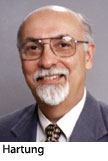Thanks very much to those of you who responded to the December “Pressure Points” involving the letter from, and my response to, the wife of a pastor of  a small, rural church who misses “the largeness of a big church,” as she put it.
a small, rural church who misses “the largeness of a big church,” as she put it.
Both the letter and my response stimulated considerable conversation, with the overwhelming majority of readers’ response expressing disagreement with me. They add depth as well as significant, divergent viewpoints to this issue which, at its core, is how we all work together to enhance and strengthen the spiritual life of the workers of the church and of their spouses and children.
In general, responses fell into two camps of those offering what they consider better responses than mine: 1) for the pastor to seek a call, and 2) for the pastor’s wife to learn the spiritual discipline of contentment where one is placed.
Most all responses suggested directly or indirectly that this is an important concern. So, most of us are agreed on that. The difference is how best to address the concern.
Here are three representative responses I received to the December column:
- As I read your article and response, I can only say that I was disheartened by your response. While I would agree that the pastor’s wife (as well as the pastor) are quite often “not ministered to,” the repercussions of suggesting, without an outright approval, [that] a pastor’s wife attend another congregation for her personal faith reasons would be far reaching. The pastor might as well resign his position in that congregation. You see, the smallness of the … congregation is what would make such a suggestion unacceptable.
While you are correct that she was right in expressing her angst, the solution is/was no solution. Solving her spiritual situation would damage if not destroy the ministry of her husband. … A better suggestion might be for her husband to make known the need for a different “call.”
- I’m afraid I’m having a very hard time with your column in the December ’05 Reporter. Perhaps it is a good answer as a psychologist, but it seems to miss the mark as something from a Lutheran pastor. … I talked with my wife [a pastor’s wife of a number of years — Ed.] about this. She agrees that it misses the mark and would add that there really needs to be something done to help pastors’ wives learn to find contentment and peace in their calling. Perhaps you could do something to help.
- Aaah … as if the extension of interpersonal relationships and getting more satisfaction out of the extra “bells and whistles” of the larger group can add one iota to what God’s Word give us in His absolution, His lessons, His benediction! `Tis the devil, the world, and our own flesh diminishing Him by fighting for satisfaction in “many things” other than the “one thing needful.”
I hope that even more readers will enter this conversation. Please let me hear from you. In the meantime, I continue to applaud the courage and articulation of the pastor’s wife who wrote me.
The first step is always to say “ouch” when something hurts. All communities, especially the communities of our parishes, need to be supportive of such voices in their midst. The suppression of such concerns among our people simply is not healthy. I continue to believe that while our core spiritual life is around Sacraments and Word in our local communities, there are other pieces that often need to be in place, some of which can and even should occur in other contexts.
The second step is to seek that which is needed. To learn even contentment often requires a spiritual or pastoral guide. A safe place and relationship for the pastor’s wife to talk over what is actually happening is imperative. Most assuredly, this discussion should occur with someone outside the parish — a mature and empathic adviser, for instance. Intentionally dealing with such personal concerns is very important.
As for other steps and ideas, perhaps our readers will help.
Rev. Bruce M. Hartung, Ph.D., is associate professor of practical theology at Concordia Seminary, St. Louis, and can be reached at hartungb@csl.edu.
Posted Dec. 29, 2005



